Bubble.io is one of the best no-code app builders on the market right now.
The platform’s stock has risen significantly in recent years thanks to its ability to deliver complex app functionality while offering a wide range of plugins and a free starter plan.
But like all the competition on the market, Bubble.io also has its downsides. For example, learning is required before you use the platform, while it also operates on a vendor lock-in model.
This essentially means you rent rather than own your app, making it challenging to migrate to another provider later down the line or scale your app without Bubble.io’s involvement.
In this blog, we’ll weigh up the platform’s key pros and cons, before providing a range of alternatives that are worth considering before you take the leap with Bubble.io.
Let’s go 👇
Bubble.io pros and cons
Pros of Bubble.io | Cons of Bubble.io |
Can build complex apps | |
Wide range of plugins available | |
Rapid prototyping | |
Free starter plan | |
Drag-and-drop interface |
Bubble.io is a flexible no-code app builder that allows you to make responsive, functional apps.
The platform uses its own visual programming language that can be used for creating full-fledged multi-user apps. As a result, you can drag and drop templates, place elements according to your preference and quickly create working prototypes.
One place where Bubble.io excels is in the availability of an extensive range of plugins and integrations, enabling you to create business apps with complex functionality.
But now, let’s take a look at some of the perceived cons of the platform.
Steep learning curve
One of the biggest challenges with Bubble.io is that the platform has a longer learning curve, especially if you want to add advanced features. You’ll either have to get help from third-party experts or invest time to train yourself for the platform.
Rigid pricing plans
When it comes to pricing, you’re likely to find more flexibility with Bubble.io’s competitors. That’s because, with Bubble.io, you have to stick with a particular price plan and the features available in that plan. This means you might have to jump to a higher plan, even if you want only one or two extra features.
In other words, you can’t customise your app to meet your business’s unique requirements unless you pay extra for a range of features you don’t want.
Also, the pricing plan of Bubble.io depends on its in-house measurement unit, the monthly workload unit (WU). Monthly workload units are a metric that is calculated by Bubble.io itself to quantify how much work the platform does for your app (i.e., database operations, web interactions and workflows).
Because of WUs, the pricing structure of Bubble.io can be difficult to get your head around. Plus, as your app grows, you might overrun your monthly WUs and have to pay $0.3 per 1k WU or buy a $349/month team plan.
Vendor lock-in
Bubble.io doesn’t provide you with ownership of your code. This means you essentially rent your software from the platform. This makes it more difficult for you to migrate your app to another provider in future without starting the development process from scratch. .
The best Bubble.io alternatives
Now that you’re aware of the upsides and downsides of Bubble.io, we’ve listed six of the best alternatives on the market below. All information in the table and subsequent copy is correct as of November 2023.
Trustpilot rating | Pricing | Technical skills required | |
Bubble.io | (App only) | Yes | |
Builder.ai | (App + Website both) | No | |
AppMachine | (App only) | No | |
BuildFire | (App only) | No | |
Adalo | Yes | ||
AppSheet | N/A | (Enterprise apps only) | Yes |
Honeycode | N/A | $0 - $30/month | Yes |
1 - Builder.ai: Best all-in-one Bubble.io alternative

Unlike Bubble.io, Builder.ai technically isn't a no-code platform, but it’s still more than a worthy competitor. Why?
Because just like a no-code app builder, it's quick to build cost-effective apps with Builder.ai and you don't need any coding skills. But unlike a no-code app builder, Builder.ai offers a fully managed service, meaning you don’t need to learn the intricacies of our platform or waste time dragging and dropping your app features. Here’s how it works:
All you need to do is simply share your app idea, and you can get tailor-made apps with 500+ features to choose from as well as infinite customisation options.
When you work with Builder.ai, yourapp development costis guaranteed in a Buildcard before your project begins. This is possible because of our pay-per-feature price plan, which allows you to truly tailor your app to your unique use case.
You add and subtract the features you want with the help of our AI product manager, Natasha, and your dedicated project manager, which are known as Productologists. You never pay for anything you don’t need.
What’s more, when you compare Builder.ai with Bubble.io, the former has no vendor lock-in. In other words, you keep your code once your two-year payment plan is complete, making it easy to migrate to another provider or scale your app without the platform.
Finally, Builder.ai offers a free app maintenance service for the first year of your project, ensuring your app and website stay up-to-date, bug-free and secure.
Pros
- 3.9 Trustpilot rating
- Can build web, mobile and desktop apps
- Custom app development
- Fully managed service - no learning curve
- Pay-per-feature pricing plan
- No vendor lock-in
- Keep your code
- Guaranteed development costs
- Limitless customisation options
- One year of free aftercare
- Lego-like building blocks and human-assisted AI help to speed up the development process
Cons
- No free option
- Not for technical entrepreneurs who want to code their app themselves
Our verdict
If you want a platform that offers more flexibility and unlimited customisations with a zero learning curve, then you should opt for Builder.ai. Unlike Bubble.io, Builder.ai doesn’t have rigid pricing plans and you can choose the features you want for your unique business.
Where Builder.ai really comes into its own, though, is in the freedom it affords its customers. As there's no vendor lock-in, plus you keep your code, you’re not tied to our platform, giving you the flexibility to change providers if needed.
Even if there’s no free plan to test-drive Builder.ai, it’s a great option for any scaling business looking to create an app.
Want to start your app project with us?
Book a demoSpeak with one of our product experts today.
By proceeding you agree to Builder.ai’s privacy policy and terms and conditions

2 - AppMachine: Best Bubble.io alternative for beginners
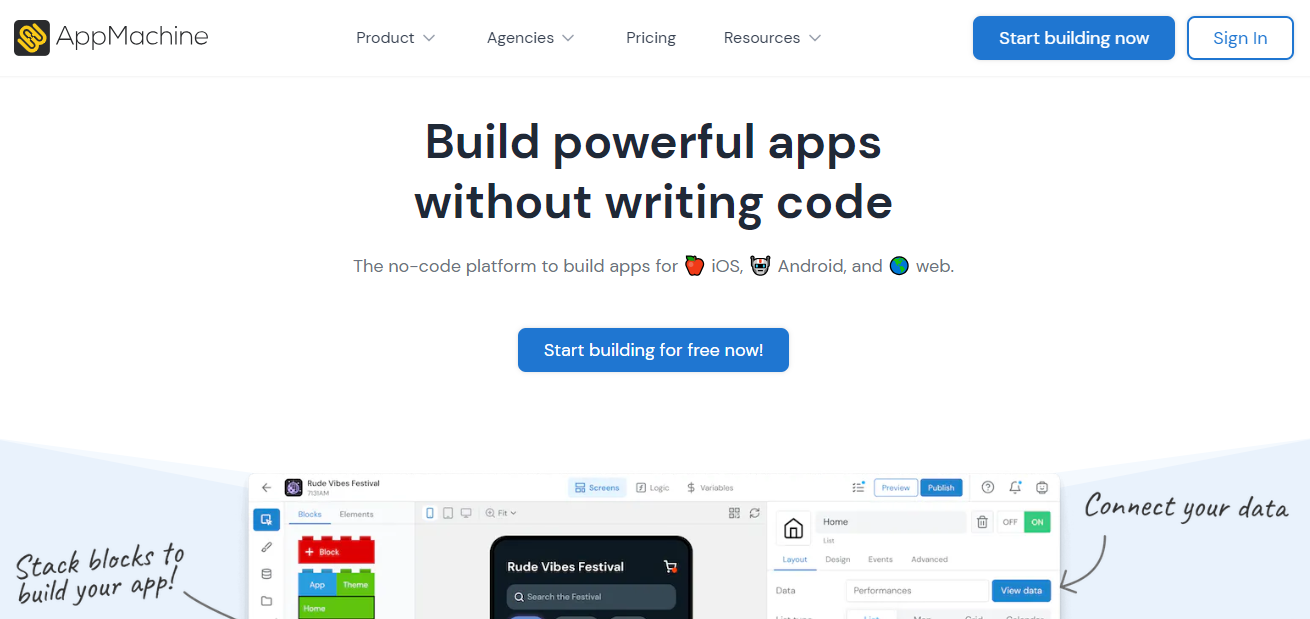
AppMachine is a cloud-based mobile app builder. On the platform, you can design and publish native iOS and Android apps using a drag-and-drop interface.
Unlike Bubble.io, AppMachine is a beginner-friendly platform and you don’t need training to use it. AppMachine’s smooth navigation and intuitive interface make it easy to use, even if you don’t have extensive technical skills to create apps.
What's more, you can simply connect your data from Excel or Google Sheets with the platform and it can turn your data into app screens.
Although the platform is beginner-friendly,it's better suited for straightforward and simple mobile app projects. AppMachine is less suited for desktop or web apps, and on the platform, you might face limitations in terms of customisation and functionality.
For instance, if you want a unique feature with specific functionality, AppMachine’s pre-built modules may not be able to meet your requirements, while its range of integrations could be too narrow for those looking for scalability.
AppMachine offers two mobile app plans. A $63/month professional plan where you won’t get dedicated support and need to pay an additional $10/month to remove AppMachine’s branding from your app and a $159/month Agency plan.
Pros
- 3.8 Trustpilot rating
- User-friendly interface
- Ease of previewing and testing the app
- Transform data into an app
- Wide range of templates
Cons
- Only for mobile applications
- Limited feature blocks
- Limited design customisation
- No support for unique specifications
- Manual bug fixing
- Vendor lock-in
Our verdict
If you want a platform that excels at being mobile-friendly and has a wide range of modules, then AppMachine can be the Bubble.io alternative for you. However, if you want your app to work on different platforms, have unique features and customisation options and scale with your business, then it may not suit your needs.
3 - BuildFire: Best Bubble.io alternative for social media integration
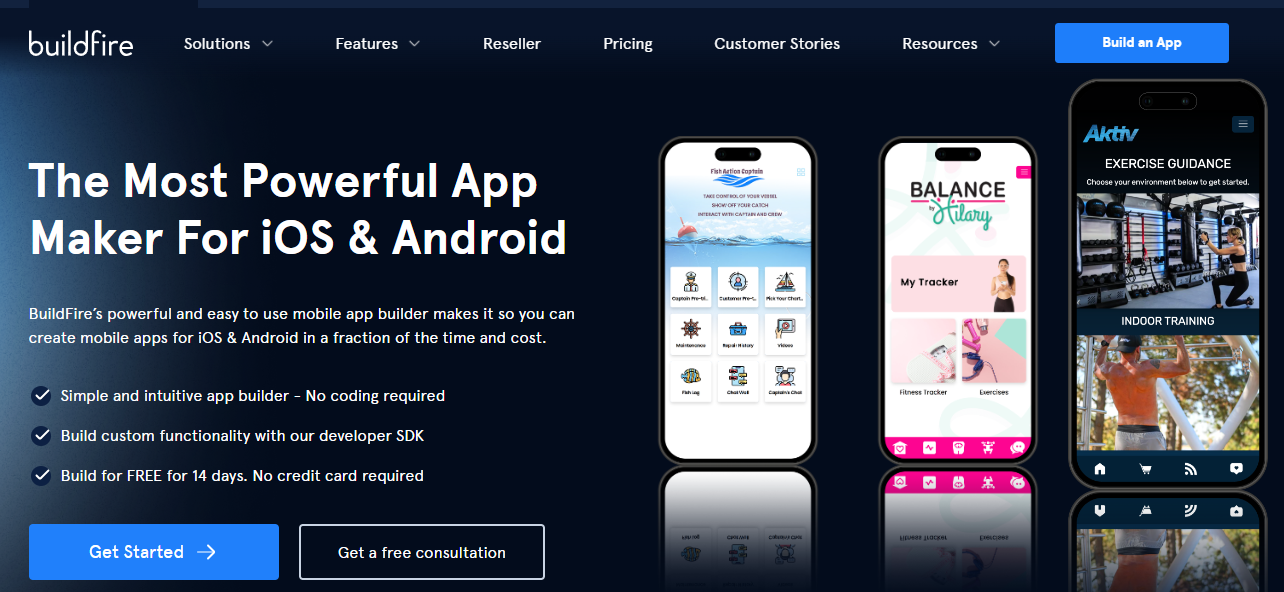
BuildFire is a popular no-code app builder that allows you to create apps for Android and iOS.
The platform offers a wide variety of pre-built template options that help you build functional as well as aesthetically pleasing apps.
Contrary to Bubble.io, BuildFire has a click-and-edit app maker that's easy and intuitive to use. You can easily customise features and see changes on the screen in real-time.
The platform offers seamless social media integration through plugins. The BuildFire marketplace features many content and media plugins where you can connect your app with third-party platforms like YouTube or Vimeo to share your existing content.
However, the BuildFire platform is on the more premium side. The price plan starts at $100/month and goes up to $499/month. The $100/month plan is fairly basic and doesn’t offer advanced features like in-app purchases, app access codes and app analytics. More robust functionality is available, starting from $349/month plan.
Moreover, like Bubble.io,youdon’t Keep your code with BuildFire, making it challenging to migrate.
Pros
- Click-and-edit app maker
- Wide variety of templates
- Easy integration of social media handles
Cons
Our verdict
If you want a functional app, don’t need extensive customisation and don’t mind paying extra bucks to build your app, then BuildFire can be a good Bubble.io alternative for you. However, if you want to scale your app, you may be better off with an alternative.
4 - Adalo: Best affordable Bubble.io alternative
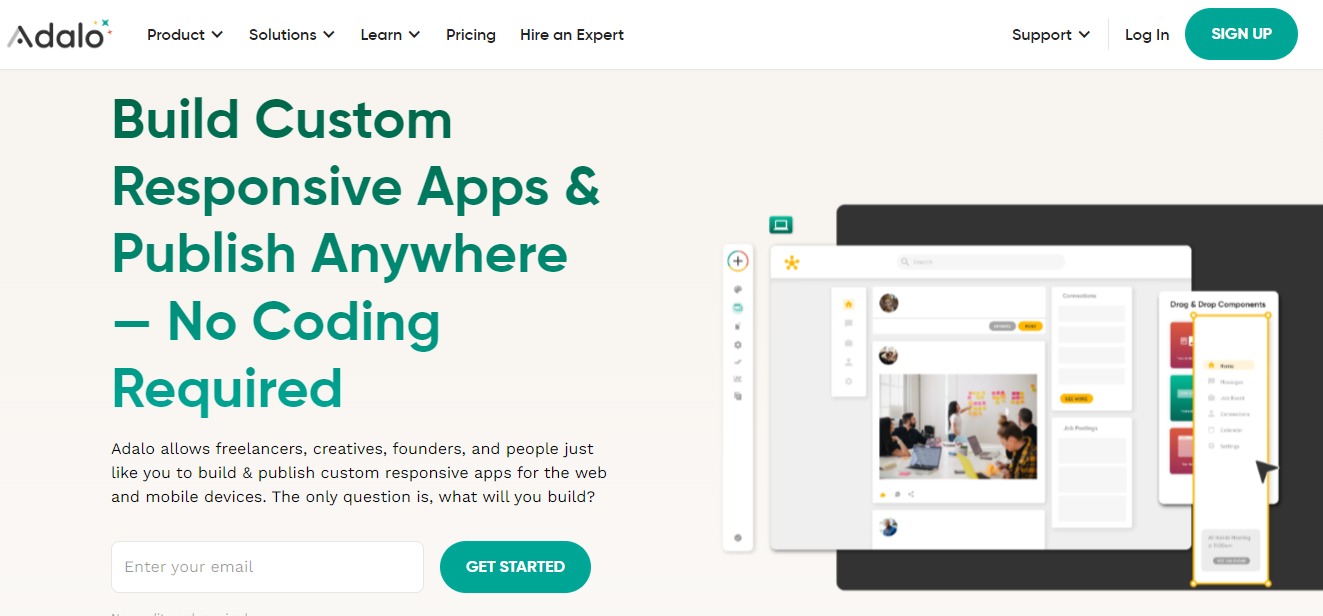
Like Bubble.io, Adalo is a drag-and-drop, no-code app builder with a longer learning curve.
You can create nicely designed apps relatively quickly if you know what you're doing and are familiar with the platform. This is because Adalo requires a database for external sources and API knowledge on your part so you can import data from external sources.
When it comes to functionality, Adalo is a powerful platform and offers hundreds of pre-built templates as well as many external integrations.
Where Adalo differs from Bubble.io is that it offers some of the mostaffordable packages in the industry, with a free package for anyone who wants to start on the platform and a $200/month plan for enterprises.
Pros
- Affordable packages
- Wide variety of pre-built templates
- External integrations
Cons
Our verdict
Adalo can be an affordable alternative to Bubble.io. You might get more value from the platform if you have some technical knowledge and are willing to spend time learning the platform.
5 - Google AppSheet: Best Bubble.io alternative for internal enterprise use cases
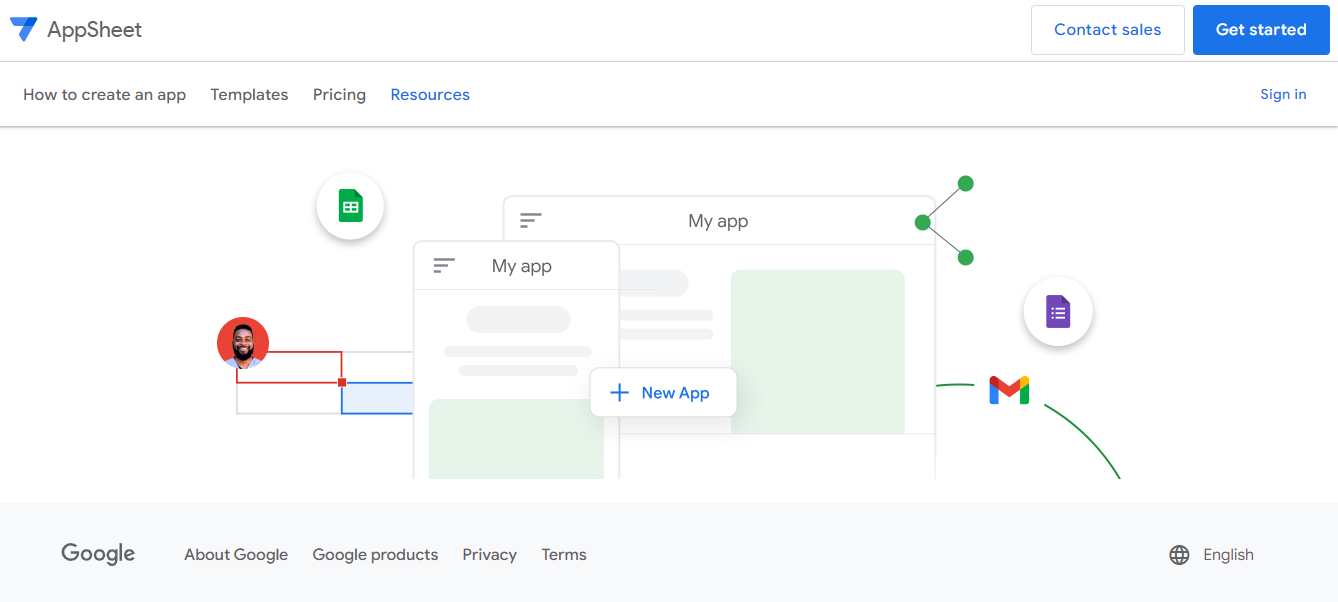
Google AppSheet is not your traditional no-code app builder. It won’t turn your business idea into an app and is more focused on enterprise use cases.
If you're an enterprise, then you can consider switching from Bubble.io to Google AppSheet, as the latter easily transforms your data into a fully functional mobile app. Simply put,if you have existing data sources like Google Sheets, Salesforce and Excel, you can easily make a mobile app using Google AppSheet without having to code.
Unlike any other platform on this list, Google AppSheet uses a totally different approach to building an app. Once you upload your data, AppSheet leverages artificial intelligence to build your app using your data file’s rows and columns. It also adds screens to view your data and create forms for data entry.
However, this platform isn’t suitable for creatingSaaS or ecommerce apps. Unlike Bubble.io, the platform doesn’t offer a drag-and-drop interface or even a canvas to design your app.
Google AppSheet has a very high dependency on data sources and requires high technical expertise to build even simple apps.
Pros
- Suitable for enterprise use cases
- Transforms raw data into a ready-to-use app
- Leverages artificial intelligence
Cons
- Need technical expertise
- Can’t make complex applications like ecommerce or SaaS apps
- Highly dependent on data sources
- Vendor lock-in
Our verdict
If you want to build a basic enterprise app that can help you and your team automate data, then Google AppSheet can be a great Bubble.io alternative. However, if you’ve got an app idea for your business and wish to share it with the world, look elsewhere.
Google AppSheet is meant to create simple apps for internal usage in an enterprise, like project trackers, managing contacts and deals, shift management, task managers, team alerts, workstation booking and more.
6 - Honeycode: Best beta Bubble.io alternative
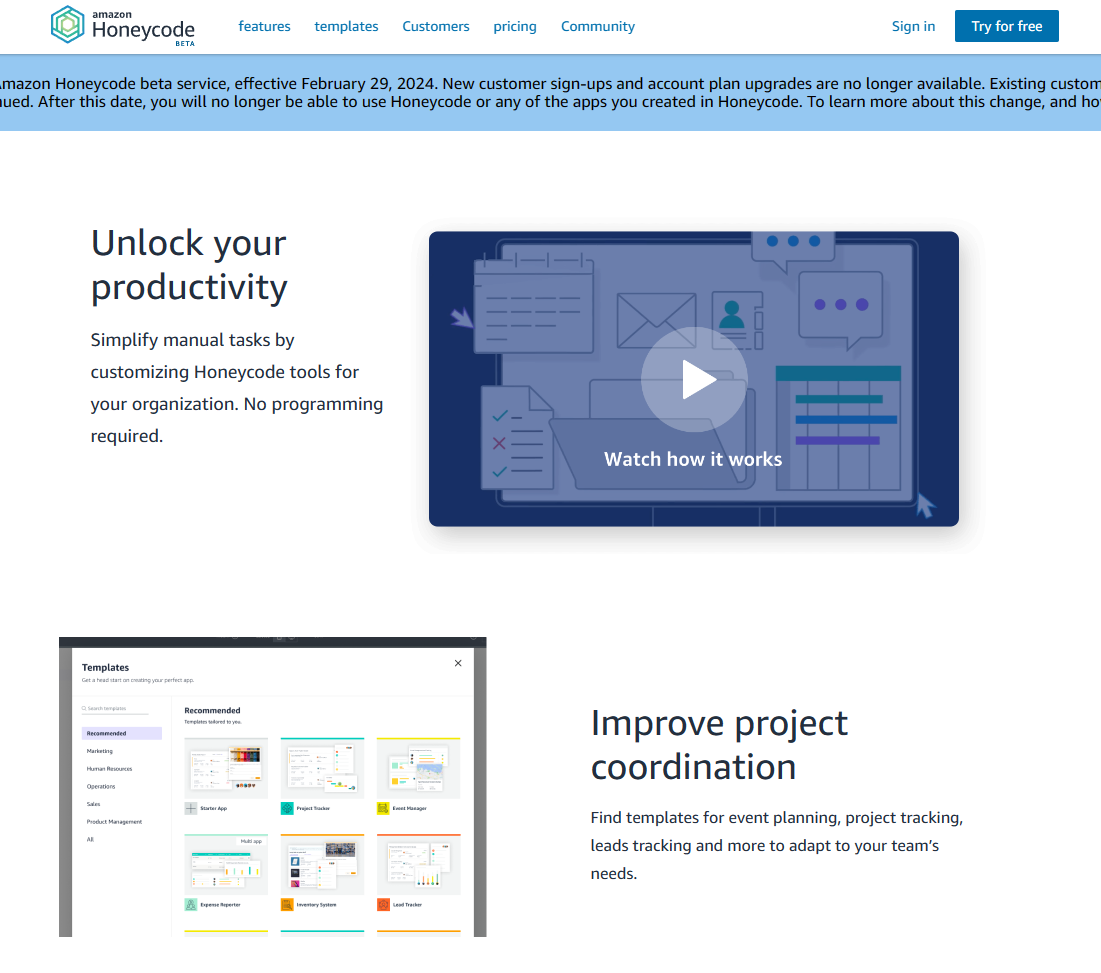
Amazon’s Honeycode is a no-code app builder available in beta. It's a spreadsheet-oriented platform that can build apps from a database, similar to AppSheet. This essentially means you simply need to add your data and the platform will create an app for you.
The platform can be used to build basic enterprise apps for use cases like internal workflows, to-do lists, inventory management and more. However, it requires deep integration with the Amazon ecosystem and isn’t suitable for complex, custom apps.
At the moment, Honeycode only offers a small range of templates to help your app get started. The apps built on Honeycode run exclusively on AWS servers and require tools like Amazon AppFlow to connect existing workflows and databases.
Pros
- Suitable for enterprise use cases
- Transforms spreadsheet data into apps
- Suitable for businesses having integration with AWS
Cons
- In beta for the past three years
- Can’t make complex apps
- Limited features and customisation
- Apps run only on AWS servers
Our verdict
If you’re an enterprise looking to automate workflows, then Honeycode is a good Bubble.io alternative for you. However, if you're an entrepreneur or a small business looking to run an ecommerce or SaaS business, Honeycode isn’t the most straightforward platform.
Conclusion
While Bubble.io is a great app builder platform with a drag-and-drop interface, it’s clear that other options on the market are worth turning your head for, depending on your use case.
Each of the platforms mentioned in the list above has its own unique selling points, and by now, you should have a clear picture in your mind of which of these platforms is best suited for your requirements.
If you’re an enterprise looking for an app that your team can use internally, then look no further than Google AppSheet. It’s a straightforward platform that doesn’t cost much.
If you’re a small business owner on a shoestring budget, can spend time training and scalability is not one of your prime requirements, then AppMachine and Adalo should be your top Bubble.io alternatives.
However, if you’re looking for a fully managed service with limitless customisation, high scalability and complete pricing transparency, then Builder.ai is your best bet.
If that sounds good to you, book a demo below 👇
Want to start your app project with us?
Book a demoSpeak with one of our product experts today.
By proceeding you agree to Builder.ai’s privacy policy and terms and conditions

Disclaimer: The content of this article is provided for informational and promotional purposes only and is derived from publicly available data and industry sources. The views and opinions expressed herein represent those of the author alone and do not necessarily reflect the official policy or position of Builder.ai. This content is intended to offer insights and is not a definitive statement on the part of Builder.ai. Readers are advised to consider the promotional nature of the article and to exercise their own judgment in interpreting the author’s perspectives. Builder.ai accepts no liability for any actions taken based on the information provided or for any consequential, special, or similar damages, even if advised of the possibility of such damages.
Stories published by the editorial team at Builder.ai.




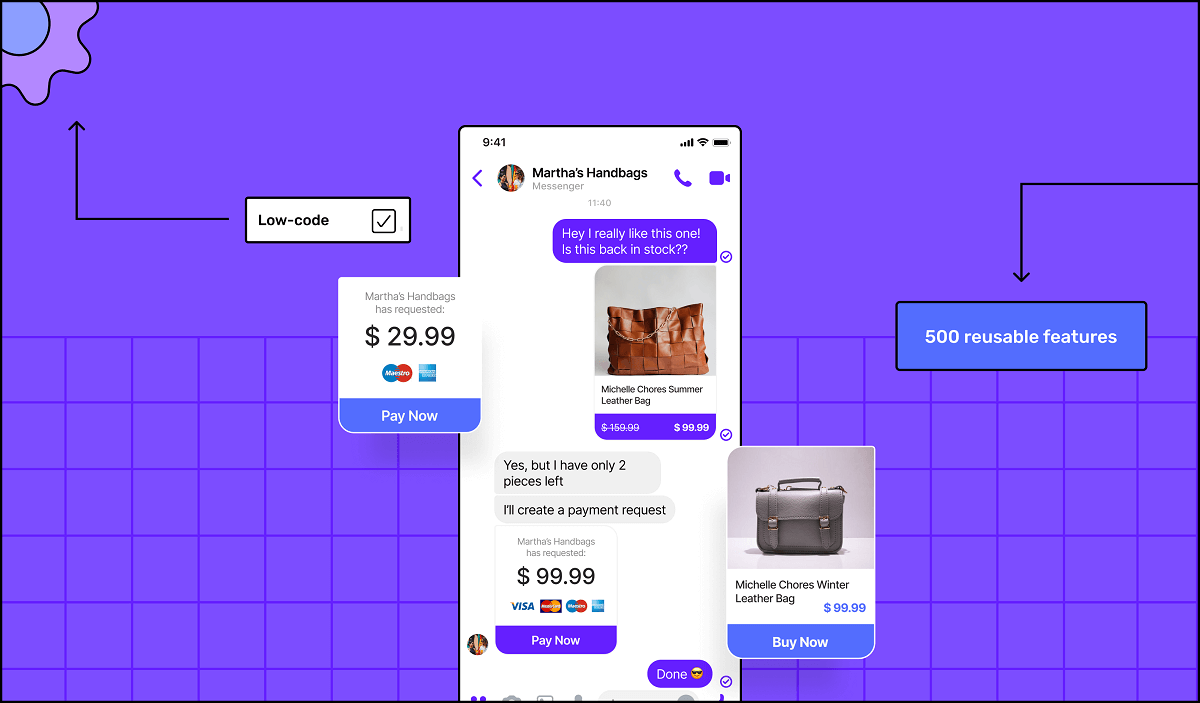








 Facebook
Facebook X
X LinkedIn
LinkedIn YouTube
YouTube Instagram
Instagram RSS
RSS


